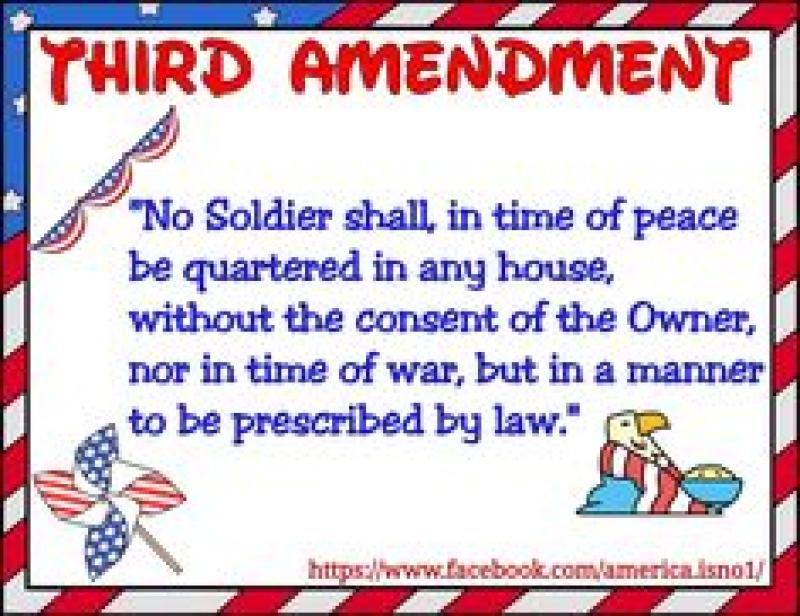
The Third Amendment to the U.S. Constitution


Third Amendment
No Soldier shall, in time of peace be quartered in any house, without the consent of the Owner, nor in time of war, but in a manner to be prescribed by law.
The third amendment to the constitution is not a matter much discussed in the never-ending debates about all things political debates of our time, but it is important nonetheless.
Cornell Law offers insight
Overview of Third Amendment, Quartering Soldiers | U.S. Constitution Annotated | US Law | LII / Legal Information Institute (cornell.edu)
The Third Amendment limits the federal government’s ability to use private homes as lodging for soldiers. The Supreme Court has never decided a case directly implicating the Third Amendment and has cited it only in a handful of opinions. As a result, some legal scholars consider the Amendment to be “an interesting study in constitutional obsolescence.” When ratified, however, the Third Amendment enshrined “protections of great importance,” reflecting the Founders’ pre-Revolutionary experiences with British soldiers and centuries of English history.
Despite the Amendment’s near-disuse as to its original protections, it took on a new dimension in the second half of the twentieth century, with courts and scholars citing it as one of the constitutional “guarantees creat[ing] zones of privacy” and for a “traditional and strong resistance of Americans to any military intrusion into civilian affairs.”
I think the most interesting and insightful points are
“creating zones of privacy”
and
“strong resistance of Americans to any military intrusion into civilian affairs”
This article is not about Trump or Biden
This article is not about the 2016 or 2020 or the 2024 election
This article is not about MAGA, or the ultra-left
This article is about the 3rd Amendment extraneous and off topic comments will be deleted

"Despite its lack of recognition, the 3rd Amendment embodies a fundamental principle inherent in American democracy. It represents a protection of individual privacy and property rights, particularly in moments when the government may try to overreach its power. To fully understand the nuances of the 3rd Amendment and its significance in American history and law, we must explore its origins, its impact, and its differences from other countries"
Understanding the 3rd Amendment - US Constitution - LAWS.com
Not a word in there about "privacy" , and especially about the idea of privacy being extended beyond not having to quarter soldiers.
Such a notion would be an interpretation of the amendment, not a reliance on the original language. Conservatives tend to pick and choose the instances where they want to strictly follow original language and when they dont.
Good point - I had never thought of it in this way before I was getting this short blog together. And I saw mention of it having been referenced in court as the basis for limiting government intrusion into our lives, which seems to speak to privacy in a sense.
Would you agree?
Try again. The right to privacy is implied in the language of the Amendment.
The right to privacy is implied in the language of the Amendment.
Privacy from the military use of the domicile is not implied it clearly stated, other implications of privacy might exist in some peoples' minds but the SCOTUS has never ruled on a privacy issue using the solely the 3rd amendment to show the "right to privacy"
Implied in the language is not enough
The British quartered Soldiers in people's houses to spy as much as to have a place for them to stay
I think you are correct
I'm sure that intelligence gathering was a benefit, but it's wasn't the principal reason for quartering soldiers in private homes, taverns, ect. In England there weren't separate soldiers quarters either. Then reason was a large fear of a standing army taking control of the government and dispersing them was thought to complicate the planning and execution of a coup. The difference was that Parliament, following the Glorious Revolution of 1688-89, forbade the government from billeting troops in private homes without the owner's permission. The Quartering Act of 1763 applicable to their colony, didn't have that exclusion.
Also, one of the first things done when an army quarters, without permission, in someone's home is they search out and seize all weapons of the private citizen which is against the second amendment. (Even with permission, I would think that the homeowner would also be compelled to turn over all weapons). All of this then goes into privacy of one's domicile, there will be no privacy, everything will be searched.
What would anyone say to the point that the 3rd Amendment has modern implications in the area of government actions, for example
eminent domain
using privately owned facilities to house illegal/unauthorized immigrants
???
There might be an analogous extension if the government occupies any private property for military or quasi-military purposes without owners expressed permission. That might include military training exercises, riot control or disaster relief.
Good points
Eminent domain is covered in the 5th amendment.
The 3rd after looking and consideration is more of a road block to forming a standing army, with protections for the people.
I remember in high school questioning this particular amendment when the constitution was studied.
I understand the reasons it came about, but came away feeling it was more about 2 things, permission and just compensation if permission was granted.